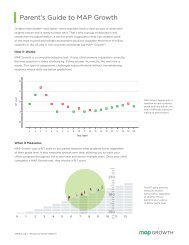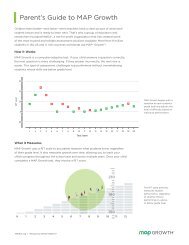Elementary School Parents Magazine
You also want an ePaper? Increase the reach of your titles
YUMPU automatically turns print PDFs into web optimized ePapers that Google loves.
www.parent-institute.com<br />
Research disproves these five<br />
common myths about learning<br />
Research shows that while<br />
people often believe they<br />
understand what “effective<br />
learning” looks like, they’re<br />
frequently mistaken.<br />
Here are five common myths about<br />
learning, along with the reseach-based<br />
facts:<br />
• Myth #1: Everyone has a specific<br />
learning style. Fact: Kids learn in all<br />
kinds of ways. In one situation, they<br />
may do better hearing new material.<br />
But in another? Seeing examples<br />
could be key.<br />
• Myth #2: You’re either born smart or<br />
you’re not. Fact: Children’s IQs and<br />
abilities can increase over time—<br />
especially when they’re given access<br />
to books and learning opportunities.<br />
• Myth #3: Long study sessions are the<br />
best way to prepare for a quiz or test.<br />
Keep your discipline technique<br />
simple to reduce frustration<br />
There’s no way around<br />
it: Your child is going<br />
to misbehave at some<br />
point—and it’s going to<br />
be frustrating! You can’t<br />
change that, but you can control your<br />
expectations and responses. That’s why<br />
the American Academy of Pediatrics<br />
offers parents this advice:<br />
• Be realistic about your child’s<br />
abilities. If you demand too<br />
much from her, you’ll both be<br />
disappointed. Make a few simple<br />
rules your child can understand.<br />
Match them to her age and level of<br />
maturity. Then expect a reasonable<br />
amount of cooperation.<br />
• Mean what you say. Think carefully<br />
before you state a rule, a promise<br />
or consequence. Is it fair? Will you<br />
Fact: Kids retain facts much better<br />
if the information is spread out over<br />
time. Studying a little each day is<br />
much more effective than trying to<br />
digest everything in one sitting.<br />
• Myth #4: Reading material over and<br />
over is the best way to learn it. Fact:<br />
It’s more effective for students to<br />
restate key ideas in their own words.<br />
• Myth #5: Right-brained students<br />
learn differently than left-brained<br />
ones. Fact: There’s no evidence<br />
that being left-brained (favoring<br />
logic and math) or right-brained<br />
(favoring art and emotions) has an<br />
impact on learning. Actually, there’s<br />
no proof that one side of the brain<br />
even dominates at all.<br />
Source: A. Kamenetz, “You Probably Believe Some<br />
Learning Myths: Take Our Quiz To Find Out,” NPR, niswc.<br />
com/elem_myths.<br />
really follow through? Once you’ve<br />
made a good decision, stick to it!<br />
Kids make better choices when they<br />
can count on what parents say.<br />
• Consider your child’s feelings.<br />
Kids appreciate parents’ understanding.<br />
It helps them behave.<br />
Say, “I know you’re disappointed<br />
that you can’t have a sleepover.<br />
Maybe another night.”<br />
• Be forgiving. No child—or parent—<br />
is perfect. If you do something you<br />
regret, such as yell at your child,<br />
discuss it when you’re calm.<br />
Apologize and say what you’ll do<br />
differently next time. Then keep<br />
your word! Teach your child that<br />
everyone can learn from mistakes.<br />
Source: “Disciplining Your Child,” American Academy<br />
of Pediatrics, niswc.com/elem_healthydiscipline.<br />
Copyright © 2018, The Parent Institute®<br />
Q: Lately, my child has been<br />
telling me he hates school. He<br />
doesn’t say it every day, but he<br />
has said it more than once. I’m<br />
not sure how to respond—he has<br />
to go to school, after all. How can<br />
I get to the root of the problem<br />
so I can help?<br />
Questions & Answers<br />
A: Not all children who say they<br />
hate school actually hate it.<br />
Sometimes, they’re just looking for<br />
attention—or for a chance to put off<br />
doing homework.<br />
However, if your son has said<br />
he hates school more than once,<br />
there could be something going on.<br />
Here’s what to do:<br />
1. Talk to your son. Wait for a time<br />
when he’s relatively calm and<br />
when you have time to talk.<br />
Then ask him to tell you how<br />
he’s feeling and why. “You’ve said<br />
you hate school a couple times.<br />
What’s making you feel this way?”<br />
2. Identify the problem. Listen<br />
closely to what your child says.<br />
Is he struggling in a class? Are<br />
students mean to him on the<br />
bus? Is he feeling overwhelmed<br />
because he’s participating in<br />
too many activities?<br />
3. Help your child find solutions.<br />
For example, if he’s struggling in<br />
a class, encourage him to spend<br />
more time on the subject and<br />
make sure he is turning in his<br />
homework.<br />
4. Be positive. Help your child<br />
see that nearly every situation<br />
has positives and negatives. By<br />
focusing on the positive, he can<br />
change his entire outlook.<br />
5. Talk to your child’s teacher.<br />
Let her know how your child is<br />
feeling and ask for her support.<br />
When parents and teachers work<br />
together, students are more likely<br />
to succeed!<br />
January 2018 • <strong>Elementary</strong> • <strong>Parents</strong> make the difference! • 3
















